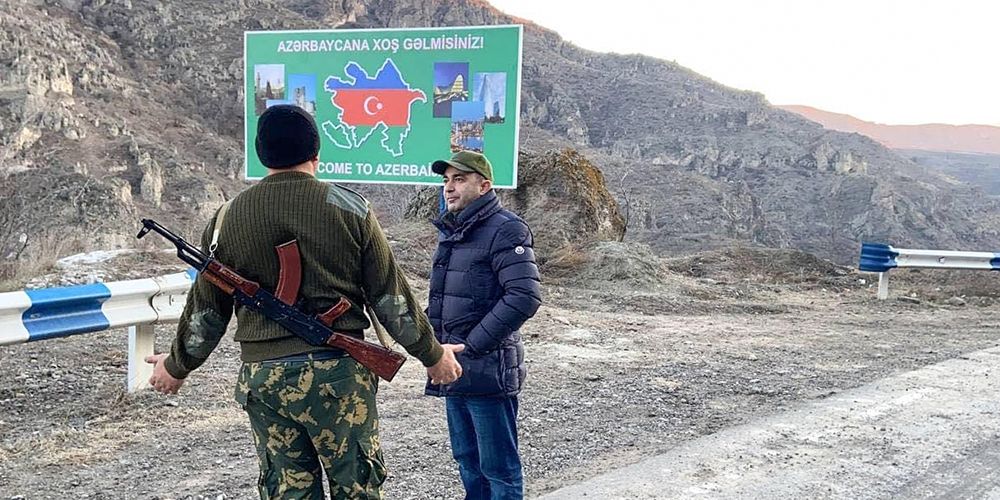Search

Publications
Frontier delimitation as the essential prerequisite for normalizing the relations between Armenia and Azerbaijan

On 24 June 2022, during the joint press-conference with Sergey Lavrov, the RF Minister of Foreign Affairs, who was on an official visit to Baku, Ceyhun Bayramov, the Minister of Foreign Affairs of Azerbaijan, stated that «for the first time starting from the moment of receiving independence, Azerbaijan and Armenia have a unique opportunity to achieve normalization and establish good neighborly relations on a state-by-state basis». [1]
Some aspects of the negotiations process
In that sense, the official BakuТs position is the feasibility of fast execution of the peace treaty between the states and implementation of the step-by-step strategy of further post-conflict settlement. It should be noted that as early as the beginning of 2021, the President of Azerbaijan Ilham Aliyev claimed that the Azeri party was «ready to turn the page of hostility and to start working at the peace treaty». It seems important that this AliyevТs proposal was supported by (or at least did not give rise to serious objections on behalf of) the main geopolitical actors operating in the Trans-Caucasian region including Russia, Turkey, «the collective West» and Iran.
It is also important that the Armenian diplomacy did not reject the peace treaty idea, and early in 2022 the bilateral negotiations between Baku and Yerevan received a new impetus. In particular, on April 7, and then on May 23 in Brussels the leaders of the two countries Ilham Aliyev and Nikol Pashinyan met with Charles Michel, the President of the European Council. They discussed a wide range of issues pertaining to the preparation of the negotiations between Armenia and Azerbaijan.
In the opinion of the Minister of Foreign Affairs of Azerbaijan Ceyhun Bayramov, Baku and Yerevan advanced most of all on the issue of opening transport communications. At the same time, it is obvious that the most important element of normalizing the relations is delimitation and the follow-up demarcation of the state frontier between Azerbaijan and Armenia, which will allow together with signing the peace treaty for excluding the territorial disputes and for decreasing the probability of the revival of the armed conflict between the two countries.
Frontier delimitation: the positions of the parties
In connection with the above it seems worth reminding here, that the frontier delimitation topic was brought up to date after the leaders of the three countries signed the Nagorno-Karabakh Ceasefire Agreement dated 10 November 2020, which became the staging ground for termination of the 2nd Karabakh War and for starting the complicated negotiations between Baku and Yerevan Ц the countries being in the antagonism and permanent conflict for almost three decades. [2] Further on, these problems were reviewed during the bilateral meetings of the President of the Russian Federation Vladimir Putin with the leaders of Azerbaijan and Armenia, as well as within the framework of the above-mentioned negotiations of I. Aliyev and N. Pashinyan with Charles Michel, the President of the European Council. The remarkable fact is that in late May 2022 the parties declared the set-up of the Inter-State Bilateral Commission for Frontier Delimitation, and the respective Decree and Directive were published at the official websites of the Armenian government and of the President of Azerbaijan. [3]
At the same time, there is certain shortage of the information about the work of the Commission in the public domain evidencing the non-transparent negotiations and lack of meaningful results in the sphere of frontier delimitation. In addition, it seems necessary to emphasize that the intensity and quality of the diplomatic efforts significantly affected by the public opinion and domestic political situation in both countries, especially in Armenia, where the opponents of the Prime Minister Pashinyan became very active starting from late 2020, i.e., from the moment of defeat in the war with Azerbaijan. These opponents use mass street process and other forms of civil disobedience striving for the resignation of the cabinet.
Considering that the opposition accuses the Armenian leader in treason and uses the nationalistic and revanchist agenda to escalate the protests, ArmeniaТs actions at the negotiations field look inconsistent. According to some experts specializing on the Armenia-Azerbaijan relations, «Nikol Pashinyan seems to be making a step forward, and immediately makes two steps backwards, fearing the reaction of his political opponents».
In our opinion, such behaviour on behalf of Yerevan impedes the progress along the peaceful settlement map, and leads to appearance of some ideas that have little to do with reality, for example, engagement of France and the US in the negotiations or revival of the OECD Minsk Group, which in fact means delaying the talks and distraction of attention. Thus, on one hand, Armenia supports the idea of signing the peace treaty with Azerbaijan including the set-up of the Inter-State Bilateral Commission for Frontier Delimitation, but on the other hand, Yerevan in the attempts to maintain the inner-policy balance plays up to the nationalists and revanchists, delaying the discharge of its obligations under the trilateral Nagorno-Karabakh Ceasefire Agreement and in the follow-up top-level agreements for an indefinite term.
Five fundamental principles of Ilham Aliyev
There is a belief that delimitation and demarcation of the state frontier between Armenia and Azerbaijan are impossible to separate from the Karabakh conflict settlement. In relation to this, the disagreements between Baku and Yerevan need to be emphasized, which, however, do not seem to be insuperable with account of the circumstances of the Second Karabakh War of September-November 2020.
It should be reminded here that prior to the defeat in the war with Azerbaijan, the Armenian diplomacy was promoting the agenda of the so-called independent Nagorno-Karabakh Republic on the international arena. At the same time, Baku was suggesting to discuss the autonomy of this region within the Azeri state and even expressed the commitment to payout monetary compensation to Armenia through the mediation of A. Lukashenko, the President of the Republic of Belarus.
Quite naturally, that after the victory in the Second Karabakh War, such autonomy is no longer relevant for the leaders of Azerbaijan, even though the Armenian party presents it as a «concession». On 31 March 2022, the President of Azerbaijan Ilham Aliyev announced that the Armenian side received the proposals containing the following five fundamental principles for normalizing the relations between the two countries:
- mutual recognition of sovereignty, territorial integrity, international frontiers inviolability and political independence of each other;
- mutual confirmation of the lack of territorial claims on behalf of both countries, undertaking the legally binding obligations not to raise such claims in future;
- refraining from endangering the security of each other in the inter-state relations, from using threats and enforcement against political independence and territorial integrity, as well as from other actions contradicting with the UN Charter;
- delimitation and demarcation of the state frontier, establishment of the diplomatic relations;
- opening transportation and other adequate communications, launching cooperation in other areas of mutual interest. [4]
In our opinion, the proposals of the President of Azerbaijan («the five fundamental principles of Ilham Aliyev») are in line with the international law, the agreements executed within the CIS framework, as well as with obligations of the parties within the context of the trilateral Nagorno-Karabakh Ceasefire Agreement dated 10 November 2020. Practical implementation of these principles does not mean any national humiliation of Armenia, but creates favorable pre-requisites for future development of the inter-state relation, for economic cooperation and gradual elimination of mental and psychological implications of this lengthy conflict in the societies of the two countries.
Nevertheless, it is worth noting that the reaction of official Yerevan to the proposals of the Azeri party was restrained. Ararat Mirzoyan, the Minister of Foreign Affairs of Armenia, did not absolutely reject the above-listed principles, but emphasized that «the negotiations need to be held without any conditions precedent» and drew the attention to the fact that the proposals of Azerbaijan did not include any «rights and freedoms for the Karabakh Armenians». [5]
Conclusions
Hence, it may be stated, that starting from the moment of ceasefire in November 2020, a certain positive advancement along the path of peaceful settlement of conflict between Armenia and Azerbaijan is observed, and the key element of such advancement is delimitation and demarcation of the state frontier. At the same time, such advancement is more about political declarations and discussions rather than practice with some effective results. The decision of the leadership of both countries to set-up the Inter-State Bilateral Commission for Frontier Delimitation is of special importance, however, it is evident that follow-up practical steps by both parties will be required to develop the negotiations schedule and to implement the achieved results into the inter-sate agreements of legal framework of both Armenia and Azerbaijan.
We should separately note certain synchronism of the steps by major geopolitical actors with respect to «pushing» the parties towards signing the peace treaty, and to assuring positive dynamics of the state frontier delimitation and demarcation. In our opinion, such «synchronism» despite different interests and competition between Russia, «the collective West» (EU, USA, UK) and Turkey in the South Caucasus region is underpinned by the strive of all the parties to increase their influence in the region by active participation in peaceful settlement and to decrease the roles of other players. The activities of the USA and France and their behind-the-scenes proposals to «assist» Armenia in reality are targeted not at protecting the Armenian interests, but at creating the illusion for Yerevan about the possibility to evade the commitments under the trilateral Nagorno-Karabakh Ceasefire Agreement dated 10 November 2020, developing the mistrust in the relations between Armenia and Russia, as well as at sabotaging the peaceful settlement process.
The analysis of the partiesТ positions makes it clear that Baku is making active diplomatic steps towards signing the peace treaty as main as possible, while the Armenian diplomacy often takes the «wait-and-see» position based both on the political situation inside the country and on the delusive promises of support on behalf by certain stakeholders of «the collective West».
At the same time, the Armenian-Azerbaijan frontier up till now remains the potential conflict zone. It is necessary to emphasize that the entire length of the frontier needs delimitation, and the sections in the North-West from the Azerbaijan side and in the North-East from the Armenian side are the most problematic, because the tension is high there and periodically frontier incidents are recorded, where the military forces of both parties are using weapons.
1. Azerbaijan and Armenia have a unique opportunity to normalize their relations. Vestnik Kavkaza, 24.06.2022.
2. The contested frontier: the principles of Azerbaijan and the concessions by Armenia. Ritm Evraziyi, 25.04.2022.
3. Pashinyan and Aliyev assigned to establish the commissions on the frontier issues in Karabakh. RBC, 23.05.2022.
4. Head of the Press Service Department of the Ministry of Foreign Affairs of the Republic of Azerbaijan Leyla Abdullayeva answers the media's question. Ministry of Foreign Affairs of the Republic of Azerbaijan.
5. For us the issue of Karabakh is not a question of territory, but that of the rights. Armenpress, 15.03.2022.







